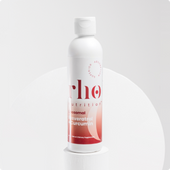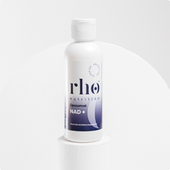Understanding Inflammation: Acute Inflammation Vs. Chronic Inflammation
You most likely have heard the term inflammation before, but what does it mean and what’s the difference between Acute and Chronic inflammation? Acute inflammation is a normal and necessary response of the body to injury or infection. It is a short-term process that occurs when the body's immune system is activated to defend against harm, such as from a cut or a bacterial infection. Think, the redness and swelling you get when you cut your finger.
During acute inflammation, immune cells and substances, such as white blood cells and cytokines, are released to the site of injury or infection. These substances help to protect the body by fighting off harmful invaders, such as bacteria or viruses, and promoting the healing process.
Acute inflammation is a normal and necessary process that helps the body defend itself and heal. However, chronic inflammation, which is a state of prolonged inflammation that wreaks havoc on the body as we will touch on next.
What Is Chronic Inflammation?
Chronic inflammation is a state of prolonged inflammation that can occur in response to various stimuli, such as an unhealthy diet, stress, or environmental toxins. It is different from acute inflammation, which is a normal response of the body to injury or infection and is usually short-lived. Chronic inflammation, on the other hand, is ongoing and can last for months or even years wreaking havoc on your body and contributing to many health problems and disease factors.
Chronic inflammation can contribute to a variety of health problems, including heart disease, diabetes, and cancer. It can also lead to the development of autoimmune diseases, in which the body's immune system mistakenly attacks healthy cells and tissues. Chronic inflammation can also cause a range of symptoms, such as fatigue, joint pain, and skin irritation.
There are several factors that can contribute to chronic inflammation, including an unhealthy diet, lack of physical activity, stress, tobacco and alcohol use, and exposure to environmental toxins. Making lifestyle and diet changes, such as eating a healthy diet, exercising regularly, getting enough sleep, and managing stress, can help reduce chronic inflammation and improve overall health.
Chronic Inflammation Linked To Heart Disease, Diabetes, Cancer, Arthritis, Autoimmune Disease, COPD and Alzheimer's:
Chronic inflammation has been linked to almost every known disease and contributes to the development of many health problems. Chronic inflammation is a state of prolonged inflammation that occurs in response to various stimuli, such as an unhealthy diet, stress, or environmental toxins. When the body's immune system is constantly activated, it can lead to the production of inflammation-promoting substances, which can damage cells and tissues over time.
In the short term this chronic inflammation may cause achy joints, brain fog, fatigue, gut issues, skin issues and much more. But when left untreated for years, chronic inflammation has been linked to many diseases such as, heart disease, diabetes, cancer, arthritis, autoimmune disease, COPD and Alzheimer's.
While chronic inflammation is not the sole cause of all diseases, it is an important factor that can contribute to the development and progression of many health conditions. Reducing chronic inflammation through lifestyle and diet changes can help improve overall health and reduce the risk of developing certain diseases.
Chronic inflammation is a low-grade, persistent immune response that can go undetected for years. It can be caused by a variety of factors, including:
-
Poor diet: Eating a diet high in processed foods, sugar, and unhealthy fats can lead to chronic inflammation. These foods can cause your body to produce more pro-inflammatory cytokines, which can increase inflammation levels in the body.
-
Sedentary lifestyle: Lack of physical activity can contribute to chronic inflammation. Exercise can help reduce inflammation by improving insulin sensitivity, reducing oxidative stress, and decreasing the production of pro-inflammatory cytokines.
-
Environmental toxins: Exposure to environmental toxins, such as air pollution, pesticides, and heavy metals, can cause chronic inflammation. These toxins can damage cells and tissues, leading to an immune response.
-
Chronic stress: Prolonged stress can increase inflammation levels in the body. Stress triggers the release of cortisol, which can lead to inflammation if produced in excess.
-
Chronic infections: Certain infections, such as hepatitis C and Lyme disease, can lead to chronic inflammation. The immune system can produce a sustained inflammatory response to these infections, which can persist even after the infection is resolved.
How to reduce chronic inflammation
Reducing chronic inflammation is essential for maintaining good health and preventing chronic diseases. Here are some strategies you can use to reduce chronic inflammation:
-
Eat an anti-inflammatory diet: An anti-inflammatory diet includes plenty of fruits, vegetables, whole grains, healthy fats, and lean protein. These foods are rich in antioxidants and other anti-inflammatory compounds that can help reduce inflammation levels in the body. Avoid processed foods, sugar, and refined carbohydrates, as they can increase inflammation.
-
Exercise regularly: Regular exercise can help reduce inflammation levels in the body. Aim for at least 30 minutes of moderate exercise most days of the week. Exercise can also improve insulin sensitivity, reduce oxidative stress, and boost immune function.
-
Manage stress: Chronic stress can increase inflammation levels in the body. Try stress-reducing techniques, such as yoga, meditation, or deep breathing exercises. These practices can help calm the mind and reduce stress levels.
-
Get enough sleep: Lack of sleep can increase inflammation levels in the body. Aim for at least 7-8 hours of sleep per night. Good sleep hygiene practices, such as avoiding caffeine and electronics before bed, can help improve sleep quality.
-
Reduce exposure to toxins: Avoid exposure to environmental toxins, such as air pollution and chemicals. Use natural cleaning products and personal care products whenever possible. Eating organic produce and meat can also reduce exposure to pesticides and hormones.
-
Take anti-inflammatory supplements: Some supplements, such as omega-3 fatty acids, curcumin, and resveratrol, have anti-inflammatory properties and can help reduce chronic inflammation. Speak with your healthcare provider before starting any supplements.
Conclusion
Chronic inflammation is a serious health issue that can increase the risk of many chronic diseases. By making lifestyle changes and taking steps to reduce inflammation, you can improve your overall health and reduce your risk of chronic disease. A healthy diet, regular exercise, stress management, good sleep hygiene, reducing exposure to toxins, and taking anti-inflammatory supplements can all help reduce chronic inflammation.













Leave a comment